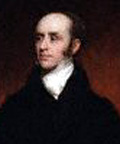Charles Grey was the second son of General Charles Grey, who served in the American War of Independence and the French Wars. Grey studied at Eton and Trinity College, Cambridge, but left without taking a degree. His political views were firmly Whig and he first entered Parliament in 1786 (MP, 1786-1807). For more than twenty years Grey sat in the House of Commons, but his ministerial experience was limited. He opposed both the Irish union in 1800 and religious discrimination against Catholics. He first took office briefly as First Lord of the Admiralty under William Grenville in 1806 and then succeeded Charles James Fox as Foreign Secretary (1806-1807) for a few months until the fall of Grenville. After Grey opposed the motion to divorce King George IV and Queen Caroline, he earned the King's resentment and forfeited any chance of gaining office during his reign. Grey became Leader of the Whig party (1807-1826, 1827-1834) and succedded his father as the 2nd Earl Grey taking his seat in the House of Lords (1807). It was then nearly a quarter century before he returned to office when the new King William IV asked him (16 Nov 1830) to form a government after the collapse of the Duke of Wellington's ministry. Grey kissed the King's hands as First Lord of the Treasury and prime minister on 22 Nov 1830. Although not supported by a Whig Cabinet, Grey attempted to secure a Reform Bill to change the antiquated parliamentary representative system. After several futile attempts to carry the bill in the Lords, the Grey government resigned (8 May 1832). The Duke of Wellington was invited to form a Tory administration, but after he failed, the King asked Grey to resume Government (15 May 1832). Wellington persuaded 100 Tory peers to abstain on the third reading of the Reform Bill in the Lords and it passed by 106 votes to 22 (4 Jun 1832). It received the Royal Assent on 7 Jun 1832 and became law. Other domestic measures taken by Grey included an act limiting working hours and, based on the findings of a Royal Commission, a Poor Law Amendment Act. He supported his able Foreign Secretary Viscount Palmerston in securing the abolition of slavery in the British Empire and wound up the East India Company as a commercial venture — an important step in the development of sound administration in India. At seventy and with the reform question resolved Grey announced his resignation to the Lords on 9 Jul 1834, having informed the King of his intention the previous day. Though the Tories failed to form an administration, Grey refused to return to office. In April 1835 he again declined an offer of his colleagues to join the government as prime minister or Foreign Secretary. [1, pp. 133-140] |

